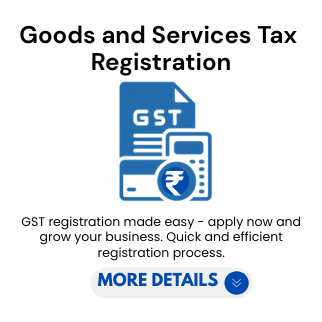Apply for GST (Good & Service Tax) Registration
GST Registration
Get your GST Registered
in just 3-7 days at Rs.499/- only.
– Legal Compliance: Registering for GST ensures adherence to taxation laws and avoids penalties.
– Input Tax Credit: GST registration enables businesses to claim input tax credit, reducing tax liability.
– Access to Government Tenders and Contracts: Many government tenders and large contracts require GST registration, making it essential for businesses seeking these opportunities.
– Smooth Banking and Financial Transactions: GST registration simplifies banking processes and loan applications.
– E-commerce Business Enablement: GST registration is often mandatory for selling on major e-commerce platforms.
– Elimination of Cascading Tax Effect: GST registration helps eliminate the cascading tax effect, where tax is paid on tax, promoting a more efficient tax structure.
– Credibility and Trust: GST registration enhances business credibility and trust with customers, suppliers, and partners.
By registering for GST, businesses can operate more efficiently, reduce tax burdens, and expand their market reach.
Registering for GST helps businesses operate efficiently, build trust, and expand market reach.
Company Registration In 4 Easy Steps
Objectives of GST Registration
1. Legal Compliance: Ensure adherence to taxation laws.
2. Input Tax Credit: Claim input tax credit to reduce tax liability.
3. Business Credibility: Enhance credibility and trust with customers and suppliers.
4. Access to Government Tenders: Qualify for government tenders and contracts.
5. Streamlined Taxation: Simplify tax processes and reduce cascading tax effects.
6. E-commerce and Online Sales: Comply with e-commerce platform requirements.
7. Tax Benefits: Avail tax benefits and deductions
Benefits of GST Registration
- 1. Legal Compliance: Avoid penalties and legal issues.
2. Input Tax Credit: Claim input tax credit to reduce tax liability.
3. Increased Credibility: Enhance business reputation and trust.
4. Access to Government Tenders: Qualify for government contracts and tenders.
5. Streamlined Taxation: Simplify tax processes and reduce compliance burden.
6. Improved Cash Flow: Claim refunds and reduce tax liability.
7. E-commerce and Online Sales: Comply with e-commerce platform requirements.
8. National Market Access: Expand business operations across India.
9. Transparency and Accountability: Maintain accurate records and reports.
GST registration offers numerous benefits, helping businesses operate efficiently and grow sustainably.
Who needs to register for GST?
Businesses with an annual turnover exceeding ₹40 lakh for goods or ₹20 lakh for services need to register for GST. Additionally, businesses involved in inter-state sales, e-commerce, or exports/imports also require GST registration.
Is GST mandatory for freelancers?
Only if their annual income exceeds ₹20 lakh (₹10 lakh in special states)
How long does it take to get a GSTIN?
Typically 3-7 working days post-submission, but it may take up to 30 working days for risky applications that require physical verification.
What documents are required for GST registration?
PAN, Aadhaar, business address proof, bank details, and other relevant legal documents such as partnership deeds or trust registration certificates.
What to keep in mind while Registering a
GST REGISTRATION ?
1. Business Structure: Ensure correct business structure (sole proprietorship, partnership, company, etc.).
2. PAN and Aadhaar: Link PAN and Aadhaar to avoid registration issues.
3. Business Address: Provide accurate business address proof.
4. Bank Account Details: Ensure correct bank account details for GST refunds.
5. Turnover Threshold: Determine if GST registration is mandatory based on turnover.
6. State-Specific Requirements: Check state-specific GST requirements and thresholds.
7. Documentation: Gather required documents (PAN, Aadhaar, address proof, etc.).
8. GST Sectors: Identify specific GST rates and compliance for your industry.











